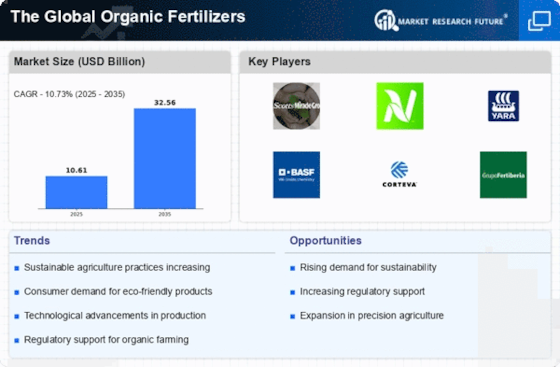-
EXECUTIVE SUMMARY
-
Market Overview
-
Key Findings
-
Market Segmentation
-
Competitive Landscape
-
Challenges and Opportunities
-
Future Outlook
-
MARKET INTRODUCTION
-
Definition
-
Scope of the study
-
Research Objective
-
Assumption
-
Limitations
-
RESEARCH METHODOLOGY
-
Overview
-
Data Mining
-
Secondary Research
-
Primary Research
-
Primary Interviews and Information Gathering Process
-
Breakdown of Primary Respondents
-
Forecasting Model
-
Market Size Estimation
-
Bottom-Up Approach
-
Top-Down Approach
-
Data Triangulation
-
Validation
-
MARKET DYNAMICS
-
Overview
-
Drivers
-
Restraints
-
Opportunities
-
MARKET FACTOR ANALYSIS
-
Value chain Analysis
-
Porter's Five Forces Analysis
-
Bargaining Power of Suppliers
-
Bargaining Power of Buyers
-
Threat of New Entrants
-
Threat of Substitutes
-
Intensity of Rivalry
-
COVID-19 Impact Analysis
-
Market Impact Analysis
-
Regional Impact
-
Opportunity and Threat Analysis
-
Organic Fertilizers Market, BY Application (USD Billion)
-
Soil Application
-
Foliar Application
-
Fertigation
-
Seed Treatment
-
Organic Fertilizers Market, BY Type (USD Billion)
-
Plant-Based
-
Animal-Based
-
Microbial-Based
-
Mineral-Based
-
Organic Fertilizers Market, BY End Use (USD Billion)
-
Crop Production
-
Horticulture
-
Forestry
-
Landscaping
-
Organic Fertilizers Market, BY Form (USD Billion)
-
Granular
-
Liquid
-
Powder
-
Organic Fertilizers Market, BY Regional (USD Billion)
-
North America
-
US
-
Canada
-
Europe
-
Germany
-
UK
-
France
-
Russia
-
Italy
-
Spain
-
Rest of Europe
-
APAC
-
China
-
India
-
Japan
-
South Korea
-
Malaysia
-
Thailand
-
Indonesia
-
Rest of APAC
-
South America
-
Brazil
-
Mexico
-
Argentina
-
Rest of South America
-
MEA
-
GCC Countries
-
South Africa
-
Rest of MEA
-
Competitive Landscape
-
Overview
-
Competitive Analysis
-
Market share Analysis
-
Major Growth Strategy in the Organic Fertilizers Market
-
Competitive Benchmarking
-
Leading Players in Terms of Number of Developments in the Organic Fertilizers Market
-
Key developments and growth strategies
-
New Product Launch/Service Deployment
-
Merger & Acquisitions
-
Joint Ventures
-
Major Players Financial Matrix
-
Sales and Operating Income
-
Major Players R&D Expenditure. 2023
-
Company Profiles
-
Agrium
-
Financial Overview
-
Products Offered
-
Key Developments
-
SWOT Analysis
-
Key Strategies
-
Advanced Nutrients
-
Financial Overview
-
Products Offered
-
Key Developments
-
SWOT Analysis
-
Key Strategies
-
Bluebiomass
-
Financial Overview
-
Products Offered
-
Key Developments
-
SWOT Analysis
-
Key Strategies
-
Ecolab
-
Financial Overview
-
Products Offered
-
Key Developments
-
SWOT Analysis
-
Key Strategies
-
Yara International
-
Financial Overview
-
Products Offered
-
Key Developments
-
SWOT Analysis
-
Key Strategies
-
Nutrien
-
Financial Overview
-
Products Offered
-
Key Developments
-
SWOT Analysis
-
Key Strategies
-
Gujarat State Fertilizers and Chemicals
-
Financial Overview
-
Products Offered
-
Key Developments
-
SWOT Analysis
-
Key Strategies
-
Helena AgriEnterprises
-
Financial Overview
-
Products Offered
-
Key Developments
-
SWOT Analysis
-
Key Strategies
-
Univar Solutions
-
Financial Overview
-
Products Offered
-
Key Developments
-
SWOT Analysis
-
Key Strategies
-
Biolchim
-
Financial Overview
-
Products Offered
-
Key Developments
-
SWOT Analysis
-
Key Strategies
-
Organic Agra
-
Financial Overview
-
Products Offered
-
Key Developments
-
SWOT Analysis
-
Key Strategies
-
Nature Safe
-
Financial Overview
-
Products Offered
-
Key Developments
-
SWOT Analysis
-
Key Strategies
-
The Scotts MiracleGro Company
-
Financial Overview
-
Products Offered
-
Key Developments
-
SWOT Analysis
-
Key Strategies
-
Osmocote
-
Financial Overview
-
Products Offered
-
Key Developments
-
SWOT Analysis
-
Key Strategies
-
Stoller Enterprises
-
Financial Overview
-
Products Offered
-
Key Developments
-
SWOT Analysis
-
Key Strategies
-
Appendix
-
References
-
Related Reports
-
LIST Of tables
-
LIST OF ASSUMPTIONS
-
North America Organic Fertilizers Market SIZE ESTIMATES & Organic Fertilizers Market, BY APPLICATION, 2019-2035 (USD Billions)
-
North America Organic Fertilizers Market SIZE ESTIMATES & Organic Fertilizers Market, BY TYPE, 2019-2035 (USD Billions)
-
North America Organic Fertilizers Market SIZE ESTIMATES & Organic Fertilizers Market, BY END USE, 2019-2035 (USD Billions)
-
North America Organic Fertilizers Market SIZE ESTIMATES & Organic Fertilizers Market, BY FORM, 2019-2035 (USD Billions)
-
North America Organic Fertilizers Market SIZE ESTIMATES & Organic Fertilizers Market, BY REGIONAL, 2019-2035 (USD Billions)
-
US Organic Fertilizers Market SIZE ESTIMATES & Organic Fertilizers Market, BY APPLICATION, 2019-2035 (USD Billions)
-
US Organic Fertilizers Market SIZE ESTIMATES & Organic Fertilizers Market, BY TYPE, 2019-2035 (USD Billions)
-
US Organic Fertilizers Market SIZE ESTIMATES & Organic Fertilizers Market, BY END USE, 2019-2035 (USD Billions)
-
US Organic Fertilizers Market SIZE ESTIMATES & Organic Fertilizers Market, BY FORM, 2019-2035 (USD Billions)
-
US Organic Fertilizers Market SIZE ESTIMATES & Organic Fertilizers Market, BY REGIONAL, 2019-2035 (USD Billions)
-
Canada Organic Fertilizers Market SIZE ESTIMATES & Organic Fertilizers Market, BY APPLICATION, 2019-2035 (USD Billions)
-
Canada Organic Fertilizers Market SIZE ESTIMATES & Organic Fertilizers Market, BY TYPE, 2019-2035 (USD Billions)
-
Canada Organic Fertilizers Market SIZE ESTIMATES & Organic Fertilizers Market, BY END USE, 2019-2035 (USD Billions)
-
Canada Organic Fertilizers Market SIZE ESTIMATES & Organic Fertilizers Market, BY FORM, 2019-2035 (USD Billions)
-
Canada Organic Fertilizers Market SIZE ESTIMATES & Organic Fertilizers Market, BY REGIONAL, 2019-2035 (USD Billions)
-
Europe Organic Fertilizers Market SIZE ESTIMATES & Organic Fertilizers Market, BY APPLICATION, 2019-2035 (USD Billions)
-
Europe Organic Fertilizers Market SIZE ESTIMATES & Organic Fertilizers Market, BY TYPE, 2019-2035 (USD Billions)
-
Europe Organic Fertilizers Market SIZE ESTIMATES & Organic Fertilizers Market, BY END USE, 2019-2035 (USD Billions)
-
Europe Organic Fertilizers Market SIZE ESTIMATES & Organic Fertilizers Market, BY FORM, 2019-2035 (USD Billions)
-
Europe Organic Fertilizers Market SIZE ESTIMATES & Organic Fertilizers Market, BY REGIONAL, 2019-2035 (USD Billions)
-
Germany Organic Fertilizers Market SIZE ESTIMATES & Organic Fertilizers Market, BY APPLICATION, 2019-2035 (USD Billions)
-
Germany Organic Fertilizers Market SIZE ESTIMATES & Organic Fertilizers Market, BY TYPE, 2019-2035 (USD Billions)
-
Germany Organic Fertilizers Market SIZE ESTIMATES & Organic Fertilizers Market, BY END USE, 2019-2035 (USD Billions)
-
Germany Organic Fertilizers Market SIZE ESTIMATES & Organic Fertilizers Market, BY FORM, 2019-2035 (USD Billions)
-
Germany Organic Fertilizers Market SIZE ESTIMATES & Organic Fertilizers Market, BY REGIONAL, 2019-2035 (USD Billions)
-
UK Organic Fertilizers Market SIZE ESTIMATES & Organic Fertilizers Market, BY APPLICATION, 2019-2035 (USD Billions)
-
UK Organic Fertilizers Market SIZE ESTIMATES & Organic Fertilizers Market, BY TYPE, 2019-2035 (USD Billions)
-
UK Organic Fertilizers Market SIZE ESTIMATES & Organic Fertilizers Market, BY END USE, 2019-2035 (USD Billions)
-
UK Organic Fertilizers Market SIZE ESTIMATES & Organic Fertilizers Market, BY FORM, 2019-2035 (USD Billions)
-
UK Organic Fertilizers Market SIZE ESTIMATES & Organic Fertilizers Market, BY REGIONAL, 2019-2035 (USD Billions)
-
France Organic Fertilizers Market SIZE ESTIMATES & Organic Fertilizers Market, BY APPLICATION, 2019-2035 (USD Billions)
-
France Organic Fertilizers Market SIZE ESTIMATES & Organic Fertilizers Market, BY TYPE, 2019-2035 (USD Billions)
-
France Organic Fertilizers Market SIZE ESTIMATES & Organic Fertilizers Market, BY END USE, 2019-2035 (USD Billions)
-
France Organic Fertilizers Market SIZE ESTIMATES & Organic Fertilizers Market, BY FORM, 2019-2035 (USD Billions)
-
France Organic Fertilizers Market SIZE ESTIMATES & Organic Fertilizers Market, BY REGIONAL, 2019-2035 (USD Billions)
-
Russia Organic Fertilizers Market SIZE ESTIMATES & Organic Fertilizers Market, BY APPLICATION, 2019-2035 (USD Billions)
-
Russia Organic Fertilizers Market SIZE ESTIMATES & Organic Fertilizers Market, BY TYPE, 2019-2035 (USD Billions)
-
Russia Organic Fertilizers Market SIZE ESTIMATES & Organic Fertilizers Market, BY END USE, 2019-2035 (USD Billions)
-
Russia Organic Fertilizers Market SIZE ESTIMATES & Organic Fertilizers Market, BY FORM, 2019-2035 (USD Billions)
-
Russia Organic Fertilizers Market SIZE ESTIMATES & Organic Fertilizers Market, BY REGIONAL, 2019-2035 (USD Billions)
-
Italy Organic Fertilizers Market SIZE ESTIMATES & Organic Fertilizers Market, BY APPLICATION, 2019-2035 (USD Billions)
-
Italy Organic Fertilizers Market SIZE ESTIMATES & Organic Fertilizers Market, BY TYPE, 2019-2035 (USD Billions)
-
Italy Organic Fertilizers Market SIZE ESTIMATES & Organic Fertilizers Market, BY END USE, 2019-2035 (USD Billions)
-
Italy Organic Fertilizers Market SIZE ESTIMATES & Organic Fertilizers Market, BY FORM, 2019-2035 (USD Billions)
-
Italy Organic Fertilizers Market SIZE ESTIMATES & Organic Fertilizers Market, BY REGIONAL, 2019-2035 (USD Billions)
-
Spain Organic Fertilizers Market SIZE ESTIMATES & Organic Fertilizers Market, BY APPLICATION, 2019-2035 (USD Billions)
-
Spain Organic Fertilizers Market SIZE ESTIMATES & Organic Fertilizers Market, BY TYPE, 2019-2035 (USD Billions)
-
Spain Organic Fertilizers Market SIZE ESTIMATES & Organic Fertilizers Market, BY END USE, 2019-2035 (USD Billions)
-
Spain Organic Fertilizers Market SIZE ESTIMATES & Organic Fertilizers Market, BY FORM, 2019-2035 (USD Billions)
-
Spain Organic Fertilizers Market SIZE ESTIMATES & Organic Fertilizers Market, BY REGIONAL, 2019-2035 (USD Billions)
-
Rest of Europe Organic Fertilizers Market SIZE ESTIMATES & Organic Fertilizers Market, BY APPLICATION, 2019-2035 (USD Billions)
-
Rest of Europe Organic Fertilizers Market SIZE ESTIMATES & Organic Fertilizers Market, BY TYPE, 2019-2035 (USD Billions)
-
Rest of Europe Organic Fertilizers Market SIZE ESTIMATES & Organic Fertilizers Market, BY END USE, 2019-2035 (USD Billions)
-
Rest of Europe Organic Fertilizers Market SIZE ESTIMATES & Organic Fertilizers Market, BY FORM, 2019-2035 (USD Billions)
-
Rest of Europe Organic Fertilizers Market SIZE ESTIMATES & Organic Fertilizers Market, BY REGIONAL, 2019-2035 (USD Billions)
-
APAC Organic Fertilizers Market SIZE ESTIMATES & Organic Fertilizers Market, BY APPLICATION, 2019-2035 (USD Billions)
-
APAC Organic Fertilizers Market SIZE ESTIMATES & Organic Fertilizers Market, BY TYPE, 2019-2035 (USD Billions)
-
APAC Organic Fertilizers Market SIZE ESTIMATES & Organic Fertilizers Market, BY END USE, 2019-2035 (USD Billions)
-
APAC Organic Fertilizers Market SIZE ESTIMATES & Organic Fertilizers Market, BY FORM, 2019-2035 (USD Billions)
-
APAC Organic Fertilizers Market SIZE ESTIMATES & Organic Fertilizers Market, BY REGIONAL, 2019-2035 (USD Billions)
-
China Organic Fertilizers Market SIZE ESTIMATES & Organic Fertilizers Market, BY APPLICATION, 2019-2035 (USD Billions)
-
China Organic Fertilizers Market SIZE ESTIMATES & Organic Fertilizers Market, BY TYPE, 2019-2035 (USD Billions)
-
China Organic Fertilizers Market SIZE ESTIMATES & Organic Fertilizers Market, BY END USE, 2019-2035 (USD Billions)
-
China Organic Fertilizers Market SIZE ESTIMATES & Organic Fertilizers Market, BY FORM, 2019-2035 (USD Billions)
-
China Organic Fertilizers Market SIZE ESTIMATES & Organic Fertilizers Market, BY REGIONAL, 2019-2035 (USD Billions)
-
India Organic Fertilizers Market SIZE ESTIMATES & Organic Fertilizers Market, BY APPLICATION, 2019-2035 (USD Billions)
-
India Organic Fertilizers Market SIZE ESTIMATES & Organic Fertilizers Market, BY TYPE, 2019-2035 (USD Billions)
-
India Organic Fertilizers Market SIZE ESTIMATES & Organic Fertilizers Market, BY END USE, 2019-2035 (USD Billions)
-
India Organic Fertilizers Market SIZE ESTIMATES & Organic Fertilizers Market, BY FORM, 2019-2035 (USD Billions)
-
India Organic Fertilizers Market SIZE ESTIMATES & Organic Fertilizers Market, BY REGIONAL, 2019-2035 (USD Billions)
-
Japan Organic Fertilizers Market SIZE ESTIMATES & Organic Fertilizers Market, BY APPLICATION, 2019-2035 (USD Billions)
-
Japan Organic Fertilizers Market SIZE ESTIMATES & Organic Fertilizers Market, BY TYPE, 2019-2035 (USD Billions)
-
Japan Organic Fertilizers Market SIZE ESTIMATES & Organic Fertilizers Market, BY END USE, 2019-2035 (USD Billions)
-
Japan Organic Fertilizers Market SIZE ESTIMATES & Organic Fertilizers Market, BY FORM, 2019-2035 (USD Billions)
-
Japan Organic Fertilizers Market SIZE ESTIMATES & Organic Fertilizers Market, BY REGIONAL, 2019-2035 (USD Billions)
-
South Korea Organic Fertilizers Market SIZE ESTIMATES & Organic Fertilizers Market, BY APPLICATION, 2019-2035 (USD Billions)
-
South Korea Organic Fertilizers Market SIZE ESTIMATES & Organic Fertilizers Market, BY TYPE, 2019-2035 (USD Billions)
-
South Korea Organic Fertilizers Market SIZE ESTIMATES & Organic Fertilizers Market, BY END USE, 2019-2035 (USD Billions)
-
South Korea Organic Fertilizers Market SIZE ESTIMATES & Organic Fertilizers Market, BY FORM, 2019-2035 (USD Billions)
-
South Korea Organic Fertilizers Market SIZE ESTIMATES & Organic Fertilizers Market, BY REGIONAL, 2019-2035 (USD Billions)
-
Malaysia Organic Fertilizers Market SIZE ESTIMATES & Organic Fertilizers Market, BY APPLICATION, 2019-2035 (USD Billions)
-
Malaysia Organic Fertilizers Market SIZE ESTIMATES & Organic Fertilizers Market, BY TYPE, 2019-2035 (USD Billions)
-
Malaysia Organic Fertilizers Market SIZE ESTIMATES & Organic Fertilizers Market, BY END USE, 2019-2035 (USD Billions)
-
Malaysia Organic Fertilizers Market SIZE ESTIMATES & Organic Fertilizers Market, BY FORM, 2019-2035 (USD Billions)
-
Malaysia Organic Fertilizers Market SIZE ESTIMATES & Organic Fertilizers Market, BY REGIONAL, 2019-2035 (USD Billions)
-
Thailand Organic Fertilizers Market SIZE ESTIMATES & Organic Fertilizers Market, BY APPLICATION, 2019-2035 (USD Billions)
-
Thailand Organic Fertilizers Market SIZE ESTIMATES & Organic Fertilizers Market, BY TYPE, 2019-2035 (USD Billions)
-
Thailand Organic Fertilizers Market SIZE ESTIMATES & Organic Fertilizers Market, BY END USE, 2019-2035 (USD Billions)
-
Thailand Organic Fertilizers Market SIZE ESTIMATES & Organic Fertilizers Market, BY FORM, 2019-2035 (USD Billions)
-
Thailand Organic Fertilizers Market SIZE ESTIMATES & Organic Fertilizers Market, BY REGIONAL, 2019-2035 (USD Billions)
-
Indonesia Organic Fertilizers Market SIZE ESTIMATES & Organic Fertilizers Market, BY APPLICATION, 2019-2035 (USD Billions)
-
Indonesia Organic Fertilizers Market SIZE ESTIMATES & Organic Fertilizers Market, BY TYPE, 2019-2035 (USD Billions)
-
Indonesia Organic Fertilizers Market SIZE ESTIMATES & Organic Fertilizers Market, BY END USE, 2019-2035 (USD Billions)
-
Indonesia Organic Fertilizers Market SIZE ESTIMATES & Organic Fertilizers Market, BY FORM, 2019-2035 (USD Billions)
-
Indonesia Organic Fertilizers Market SIZE ESTIMATES & Organic Fertilizers Market, BY REGIONAL, 2019-2035 (USD Billions)
-
Rest of APAC Organic Fertilizers Market SIZE ESTIMATES & Organic Fertilizers Market, BY APPLICATION, 2019-2035 (USD Billions)
-
Rest of APAC Organic Fertilizers Market SIZE ESTIMATES & Organic Fertilizers Market, BY TYPE, 2019-2035 (USD Billions)
-
Rest of APAC Organic Fertilizers Market SIZE ESTIMATES & Organic Fertilizers Market, BY END USE, 2019-2035 (USD Billions)
-
Rest of APAC Organic Fertilizers Market SIZE ESTIMATES & Organic Fertilizers Market, BY FORM, 2019-2035 (USD Billions)
-
Rest of APAC Organic Fertilizers Market SIZE ESTIMATES & Organic Fertilizers Market, BY REGIONAL, 2019-2035 (USD Billions)
-
South America Organic Fertilizers Market SIZE ESTIMATES & Organic Fertilizers Market, BY APPLICATION, 2019-2035 (USD Billions)
-
South America Organic Fertilizers Market SIZE ESTIMATES & Organic Fertilizers Market, BY TYPE, 2019-2035 (USD Billions)
-
South America Organic Fertilizers Market SIZE ESTIMATES & Organic Fertilizers Market, BY END USE, 2019-2035 (USD Billions)
-
South America Organic Fertilizers Market SIZE ESTIMATES & Organic Fertilizers Market, BY FORM, 2019-2035 (USD Billions)
-
South America Organic Fertilizers Market SIZE ESTIMATES & Organic Fertilizers Market, BY REGIONAL, 2019-2035 (USD Billions)
-
Brazil Organic Fertilizers Market SIZE ESTIMATES & Organic Fertilizers Market, BY APPLICATION, 2019-2035 (USD Billions)
-
Brazil Organic Fertilizers Market SIZE ESTIMATES & Organic Fertilizers Market, BY TYPE, 2019-2035 (USD Billions)
-
Brazil Organic Fertilizers Market SIZE ESTIMATES & Organic Fertilizers Market, BY END USE, 2019-2035 (USD Billions)
-
Brazil Organic Fertilizers Market SIZE ESTIMATES & Organic Fertilizers Market, BY FORM, 2019-2035 (USD Billions)
-
Brazil Organic Fertilizers Market SIZE ESTIMATES & Organic Fertilizers Market, BY REGIONAL, 2019-2035 (USD Billions)
-
Mexico Organic Fertilizers Market SIZE ESTIMATES & Organic Fertilizers Market, BY APPLICATION, 2019-2035 (USD Billions)
-
Mexico Organic Fertilizers Market SIZE ESTIMATES & Organic Fertilizers Market, BY TYPE, 2019-2035 (USD Billions)
-
Mexico Organic Fertilizers Market SIZE ESTIMATES & Organic Fertilizers Market, BY END USE, 2019-2035 (USD Billions)
-
Mexico Organic Fertilizers Market SIZE ESTIMATES & Organic Fertilizers Market, BY FORM, 2019-2035 (USD Billions)
-
Mexico Organic Fertilizers Market SIZE ESTIMATES & Organic Fertilizers Market, BY REGIONAL, 2019-2035 (USD Billions)
-
Argentina Organic Fertilizers Market SIZE ESTIMATES & Organic Fertilizers Market, BY APPLICATION, 2019-2035 (USD Billions)
-
Argentina Organic Fertilizers Market SIZE ESTIMATES & Organic Fertilizers Market, BY TYPE, 2019-2035 (USD Billions)
-
Argentina Organic Fertilizers Market SIZE ESTIMATES & Organic Fertilizers Market, BY END USE, 2019-2035 (USD Billions)
-
Argentina Organic Fertilizers Market SIZE ESTIMATES & Organic Fertilizers Market, BY FORM, 2019-2035 (USD Billions)
-
Argentina Organic Fertilizers Market SIZE ESTIMATES & Organic Fertilizers Market, BY REGIONAL, 2019-2035 (USD Billions)
-
Rest of South America Organic Fertilizers Market SIZE ESTIMATES & Organic Fertilizers Market, BY APPLICATION, 2019-2035 (USD Billions)
-
Rest of South America Organic Fertilizers Market SIZE ESTIMATES & Organic Fertilizers Market, BY TYPE, 2019-2035 (USD Billions)
-
Rest of South America Organic Fertilizers Market SIZE ESTIMATES & Organic Fertilizers Market, BY END USE, 2019-2035 (USD Billions)
-
Rest of South America Organic Fertilizers Market SIZE ESTIMATES & Organic Fertilizers Market, BY FORM, 2019-2035 (USD Billions)
-
Rest of South America Organic Fertilizers Market SIZE ESTIMATES & Organic Fertilizers Market, BY REGIONAL, 2019-2035 (USD Billions)
-
MEA Organic Fertilizers Market SIZE ESTIMATES & Organic Fertilizers Market, BY APPLICATION, 2019-2035 (USD Billions)
-
MEA Organic Fertilizers Market SIZE ESTIMATES & Organic Fertilizers Market, BY TYPE, 2019-2035 (USD Billions)
-
MEA Organic Fertilizers Market SIZE ESTIMATES & Organic Fertilizers Market, BY END USE, 2019-2035 (USD Billions)
-
MEA Organic Fertilizers Market SIZE ESTIMATES & Organic Fertilizers Market, BY FORM, 2019-2035 (USD Billions)
-
MEA Organic Fertilizers Market SIZE ESTIMATES & Organic Fertilizers Market, BY REGIONAL, 2019-2035 (USD Billions)
-
GCC Countries Organic Fertilizers Market SIZE ESTIMATES & Organic Fertilizers Market, BY APPLICATION, 2019-2035 (USD Billions)
-
GCC Countries Organic Fertilizers Market SIZE ESTIMATES & Organic Fertilizers Market, BY TYPE, 2019-2035 (USD Billions)
-
GCC Countries Organic Fertilizers Market SIZE ESTIMATES & Organic Fertilizers Market, BY END USE, 2019-2035 (USD Billions)
-
GCC Countries Organic Fertilizers Market SIZE ESTIMATES & Organic Fertilizers Market, BY FORM, 2019-2035 (USD Billions)
-
GCC Countries Organic Fertilizers Market SIZE ESTIMATES & Organic Fertilizers Market, BY REGIONAL, 2019-2035 (USD Billions)
-
South Africa Organic Fertilizers Market SIZE ESTIMATES & Organic Fertilizers Market, BY APPLICATION, 2019-2035 (USD Billions)
-
South Africa Organic Fertilizers Market SIZE ESTIMATES & Organic Fertilizers Market, BY TYPE, 2019-2035 (USD Billions)
-
South Africa Organic Fertilizers Market SIZE ESTIMATES & Organic Fertilizers Market, BY END USE, 2019-2035 (USD Billions)
-
South Africa Organic Fertilizers Market SIZE ESTIMATES & Organic Fertilizers Market, BY FORM, 2019-2035 (USD Billions)
-
South Africa Organic Fertilizers Market SIZE ESTIMATES & Organic Fertilizers Market, BY REGIONAL, 2019-2035 (USD Billions)
-
Rest of MEA Organic Fertilizers Market SIZE ESTIMATES & Organic Fertilizers Market, BY APPLICATION, 2019-2035 (USD Billions)
-
Rest of MEA Organic Fertilizers Market SIZE ESTIMATES & Organic Fertilizers Market, BY TYPE, 2019-2035 (USD Billions)
-
Rest of MEA Organic Fertilizers Market SIZE ESTIMATES & Organic Fertilizers Market, BY END USE, 2019-2035 (USD Billions)
-
Rest of MEA Organic Fertilizers Market SIZE ESTIMATES & Organic Fertilizers Market, BY FORM, 2019-2035 (USD Billions)
-
Rest of MEA Organic Fertilizers Market SIZE ESTIMATES & Organic Fertilizers Market, BY REGIONAL, 2019-2035 (USD Billions)
-
PRODUCT LAUNCH/PRODUCT DEVELOPMENT/APPROVAL
-
ACQUISITION/PARTNERSHIP
-
LIST Of figures
-
MARKET SYNOPSIS
-
NORTH AMERICA ORGANIC FERTILIZERS MARKET ANALYSIS
-
US ORGANIC FERTILIZERS MARKET ANALYSIS BY APPLICATION
-
US ORGANIC FERTILIZERS MARKET ANALYSIS BY TYPE
-
US ORGANIC FERTILIZERS MARKET ANALYSIS BY END USE
-
US ORGANIC FERTILIZERS MARKET ANALYSIS BY FORM
-
US ORGANIC FERTILIZERS MARKET ANALYSIS BY REGIONAL
-
CANADA ORGANIC FERTILIZERS MARKET ANALYSIS BY APPLICATION
-
CANADA ORGANIC FERTILIZERS MARKET ANALYSIS BY TYPE
-
CANADA ORGANIC FERTILIZERS MARKET ANALYSIS BY END USE
-
CANADA ORGANIC FERTILIZERS MARKET ANALYSIS BY FORM
-
CANADA ORGANIC FERTILIZERS MARKET ANALYSIS BY REGIONAL
-
EUROPE ORGANIC FERTILIZERS MARKET ANALYSIS
-
GERMANY ORGANIC FERTILIZERS MARKET ANALYSIS BY APPLICATION
-
GERMANY ORGANIC FERTILIZERS MARKET ANALYSIS BY TYPE
-
GERMANY ORGANIC FERTILIZERS MARKET ANALYSIS BY END USE
-
GERMANY ORGANIC FERTILIZERS MARKET ANALYSIS BY FORM
-
GERMANY ORGANIC FERTILIZERS MARKET ANALYSIS BY REGIONAL
-
UK ORGANIC FERTILIZERS MARKET ANALYSIS BY APPLICATION
-
UK ORGANIC FERTILIZERS MARKET ANALYSIS BY TYPE
-
UK ORGANIC FERTILIZERS MARKET ANALYSIS BY END USE
-
UK ORGANIC FERTILIZERS MARKET ANALYSIS BY FORM
-
UK ORGANIC FERTILIZERS MARKET ANALYSIS BY REGIONAL
-
FRANCE ORGANIC FERTILIZERS MARKET ANALYSIS BY APPLICATION
-
FRANCE ORGANIC FERTILIZERS MARKET ANALYSIS BY TYPE
-
FRANCE ORGANIC FERTILIZERS MARKET ANALYSIS BY END USE
-
FRANCE ORGANIC FERTILIZERS MARKET ANALYSIS BY FORM
-
FRANCE ORGANIC FERTILIZERS MARKET ANALYSIS BY REGIONAL
-
RUSSIA ORGANIC FERTILIZERS MARKET ANALYSIS BY APPLICATION
-
RUSSIA ORGANIC FERTILIZERS MARKET ANALYSIS BY TYPE
-
RUSSIA ORGANIC FERTILIZERS MARKET ANALYSIS BY END USE
-
RUSSIA ORGANIC FERTILIZERS MARKET ANALYSIS BY FORM
-
RUSSIA ORGANIC FERTILIZERS MARKET ANALYSIS BY REGIONAL
-
ITALY ORGANIC FERTILIZERS MARKET ANALYSIS BY APPLICATION
-
ITALY ORGANIC FERTILIZERS MARKET ANALYSIS BY TYPE
-
ITALY ORGANIC FERTILIZERS MARKET ANALYSIS BY END USE
-
ITALY ORGANIC FERTILIZERS MARKET ANALYSIS BY FORM
-
ITALY ORGANIC FERTILIZERS MARKET ANALYSIS BY REGIONAL
-
SPAIN ORGANIC FERTILIZERS MARKET ANALYSIS BY APPLICATION
-
SPAIN ORGANIC FERTILIZERS MARKET ANALYSIS BY TYPE
-
SPAIN ORGANIC FERTILIZERS MARKET ANALYSIS BY END USE
-
SPAIN ORGANIC FERTILIZERS MARKET ANALYSIS BY FORM
-
SPAIN ORGANIC FERTILIZERS MARKET ANALYSIS BY REGIONAL
-
REST OF EUROPE ORGANIC FERTILIZERS MARKET ANALYSIS BY APPLICATION
-
REST OF EUROPE ORGANIC FERTILIZERS MARKET ANALYSIS BY TYPE
-
REST OF EUROPE ORGANIC FERTILIZERS MARKET ANALYSIS BY END USE
-
REST OF EUROPE ORGANIC FERTILIZERS MARKET ANALYSIS BY FORM
-
REST OF EUROPE ORGANIC FERTILIZERS MARKET ANALYSIS BY REGIONAL
-
APAC ORGANIC FERTILIZERS MARKET ANALYSIS
-
CHINA ORGANIC FERTILIZERS MARKET ANALYSIS BY APPLICATION
-
CHINA ORGANIC FERTILIZERS MARKET ANALYSIS BY TYPE
-
CHINA ORGANIC FERTILIZERS MARKET ANALYSIS BY END USE
-
CHINA ORGANIC FERTILIZERS MARKET ANALYSIS BY FORM
-
CHINA ORGANIC FERTILIZERS MARKET ANALYSIS BY REGIONAL
-
INDIA ORGANIC FERTILIZERS MARKET ANALYSIS BY APPLICATION
-
INDIA ORGANIC FERTILIZERS MARKET ANALYSIS BY TYPE
-
INDIA ORGANIC FERTILIZERS MARKET ANALYSIS BY END USE
-
INDIA ORGANIC FERTILIZERS MARKET ANALYSIS BY FORM
-
INDIA ORGANIC FERTILIZERS MARKET ANALYSIS BY REGIONAL
-
JAPAN ORGANIC FERTILIZERS MARKET ANALYSIS BY APPLICATION
-
JAPAN ORGANIC FERTILIZERS MARKET ANALYSIS BY TYPE
-
JAPAN ORGANIC FERTILIZERS MARKET ANALYSIS BY END USE
-
JAPAN ORGANIC FERTILIZERS MARKET ANALYSIS BY FORM
-
JAPAN ORGANIC FERTILIZERS MARKET ANALYSIS BY REGIONAL
-
SOUTH KOREA ORGANIC FERTILIZERS MARKET ANALYSIS BY APPLICATION
-
SOUTH KOREA ORGANIC FERTILIZERS MARKET ANALYSIS BY TYPE
-
SOUTH KOREA ORGANIC FERTILIZERS MARKET ANALYSIS BY END USE
-
SOUTH KOREA ORGANIC FERTILIZERS MARKET ANALYSIS BY FORM
-
SOUTH KOREA ORGANIC FERTILIZERS MARKET ANALYSIS BY REGIONAL
-
MALAYSIA ORGANIC FERTILIZERS MARKET ANALYSIS BY APPLICATION
-
MALAYSIA ORGANIC FERTILIZERS MARKET ANALYSIS BY TYPE
-
MALAYSIA ORGANIC FERTILIZERS MARKET ANALYSIS BY END USE
-
MALAYSIA ORGANIC FERTILIZERS MARKET ANALYSIS BY FORM
-
MALAYSIA ORGANIC FERTILIZERS MARKET ANALYSIS BY REGIONAL
-
THAILAND ORGANIC FERTILIZERS MARKET ANALYSIS BY APPLICATION
-
THAILAND ORGANIC FERTILIZERS MARKET ANALYSIS BY TYPE
-
THAILAND ORGANIC FERTILIZERS MARKET ANALYSIS BY END USE
-
THAILAND ORGANIC FERTILIZERS MARKET ANALYSIS BY FORM
-
THAILAND ORGANIC FERTILIZERS MARKET ANALYSIS BY REGIONAL
-
INDONESIA ORGANIC FERTILIZERS MARKET ANALYSIS BY APPLICATION
-
INDONESIA ORGANIC FERTILIZERS MARKET ANALYSIS BY TYPE
-
INDONESIA ORGANIC FERTILIZERS MARKET ANALYSIS BY END USE
-
INDONESIA ORGANIC FERTILIZERS MARKET ANALYSIS BY FORM
-
INDONESIA ORGANIC FERTILIZERS MARKET ANALYSIS BY REGIONAL
-
REST OF APAC ORGANIC FERTILIZERS MARKET ANALYSIS BY APPLICATION
-
REST OF APAC ORGANIC FERTILIZERS MARKET ANALYSIS BY TYPE
-
REST OF APAC ORGANIC FERTILIZERS MARKET ANALYSIS BY END USE
-
REST OF APAC ORGANIC FERTILIZERS MARKET ANALYSIS BY FORM
-
REST OF APAC ORGANIC FERTILIZERS MARKET ANALYSIS BY REGIONAL
-
SOUTH AMERICA ORGANIC FERTILIZERS MARKET ANALYSIS
-
BRAZIL ORGANIC FERTILIZERS MARKET ANALYSIS BY APPLICATION
-
BRAZIL ORGANIC FERTILIZERS MARKET ANALYSIS BY TYPE
-
BRAZIL ORGANIC FERTILIZERS MARKET ANALYSIS BY END USE
-
BRAZIL ORGANIC FERTILIZERS MARKET ANALYSIS BY FORM
-
BRAZIL ORGANIC FERTILIZERS MARKET ANALYSIS BY REGIONAL
-
MEXICO ORGANIC FERTILIZERS MARKET ANALYSIS BY APPLICATION
-
MEXICO ORGANIC FERTILIZERS MARKET ANALYSIS BY TYPE
-
MEXICO ORGANIC FERTILIZERS MARKET ANALYSIS BY END USE
-
MEXICO ORGANIC FERTILIZERS MARKET ANALYSIS BY FORM
-
MEXICO ORGANIC FERTILIZERS MARKET ANALYSIS BY REGIONAL
-
ARGENTINA ORGANIC FERTILIZERS MARKET ANALYSIS BY APPLICATION
-
ARGENTINA ORGANIC FERTILIZERS MARKET ANALYSIS BY TYPE
-
ARGENTINA ORGANIC FERTILIZERS MARKET ANALYSIS BY END USE
-
ARGENTINA ORGANIC FERTILIZERS MARKET ANALYSIS BY FORM
-
ARGENTINA ORGANIC FERTILIZERS MARKET ANALYSIS BY REGIONAL
-
REST OF SOUTH AMERICA ORGANIC FERTILIZERS MARKET ANALYSIS BY APPLICATION
-
REST OF SOUTH AMERICA ORGANIC FERTILIZERS MARKET ANALYSIS BY TYPE
-
REST OF SOUTH AMERICA ORGANIC FERTILIZERS MARKET ANALYSIS BY END USE
-
REST OF SOUTH AMERICA ORGANIC FERTILIZERS MARKET ANALYSIS BY FORM
-
REST OF SOUTH AMERICA ORGANIC FERTILIZERS MARKET ANALYSIS BY REGIONAL
-
MEA ORGANIC FERTILIZERS MARKET ANALYSIS
-
GCC COUNTRIES ORGANIC FERTILIZERS MARKET ANALYSIS BY APPLICATION
-
GCC COUNTRIES ORGANIC FERTILIZERS MARKET ANALYSIS BY TYPE
-
GCC COUNTRIES ORGANIC FERTILIZERS MARKET ANALYSIS BY END USE
-
GCC COUNTRIES ORGANIC FERTILIZERS MARKET ANALYSIS BY FORM
-
GCC COUNTRIES ORGANIC FERTILIZERS MARKET ANALYSIS BY REGIONAL
-
SOUTH AFRICA ORGANIC FERTILIZERS MARKET ANALYSIS BY APPLICATION
-
SOUTH AFRICA ORGANIC FERTILIZERS MARKET ANALYSIS BY TYPE
-
SOUTH AFRICA ORGANIC FERTILIZERS MARKET ANALYSIS BY END USE
-
SOUTH AFRICA ORGANIC FERTILIZERS MARKET ANALYSIS BY FORM
-
SOUTH AFRICA ORGANIC FERTILIZERS MARKET ANALYSIS BY REGIONAL
-
REST OF MEA ORGANIC FERTILIZERS MARKET ANALYSIS BY APPLICATION
-
REST OF MEA ORGANIC FERTILIZERS MARKET ANALYSIS BY TYPE
-
REST OF MEA ORGANIC FERTILIZERS MARKET ANALYSIS BY END USE
-
REST OF MEA ORGANIC FERTILIZERS MARKET ANALYSIS BY FORM
-
REST OF MEA ORGANIC FERTILIZERS MARKET ANALYSIS BY REGIONAL
-
KEY BUYING CRITERIA OF ORGANIC FERTILIZERS MARKET
-
RESEARCH PROCESS OF MRFR
-
DRO ANALYSIS OF ORGANIC FERTILIZERS MARKET
-
DRIVERS IMPACT ANALYSIS: ORGANIC FERTILIZERS MARKET
-
RESTRAINTS IMPACT ANALYSIS: ORGANIC FERTILIZERS MARKET
-
SUPPLY / VALUE CHAIN: ORGANIC FERTILIZERS MARKET
-
Organic Fertilizers Market, BY APPLICATION, 2025 (% SHARE)
-
Organic Fertilizers Market, BY APPLICATION, 2019 TO 2035 (USD Billions)
-
Organic Fertilizers Market, BY TYPE, 2025 (% SHARE)
-
Organic Fertilizers Market, BY TYPE, 2019 TO 2035 (USD Billions)
-
Organic Fertilizers Market, BY END USE, 2025 (% SHARE)
-
Organic Fertilizers Market, BY END USE, 2019 TO 2035 (USD Billions)
-
Organic Fertilizers Market, BY FORM, 2025 (% SHARE)
-
Organic Fertilizers Market, BY FORM, 2019 TO 2035 (USD Billions)
-
Organic Fertilizers Market, BY REGIONAL, 2025 (% SHARE)
-
Organic Fertilizers Market, BY REGIONAL, 2019 TO 2035 (USD Billions)
-
BENCHMARKING OF MAJOR COMPETITORS
-
"


















Leave a Comment